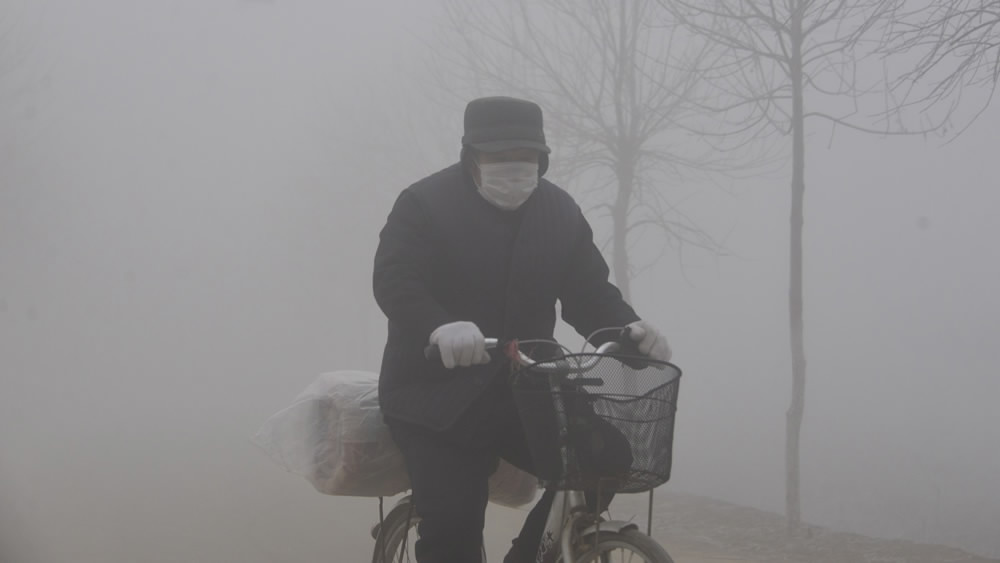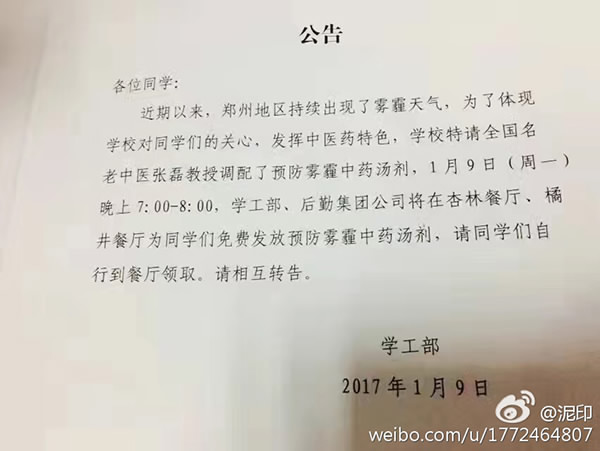
China
22:15, 12-Jan-2017
Chinese university offers students ‘anti-smog’ herbal remedies
Updated
10:34, 28-Jun-2018

Can Chinese herbal remedies combat the harmful effects of smog? As China suffers from frequent bouts of prolonged smog in the winter, some residents are seeking help from traditional Chinese medicine.
Students at Henan University of Chinese Medicine in Zhengzhou, central China, recently received a special gift – “anti-smog” herbal medicine based on a recipe by Zhang Lei, a professor of Chinese medicine of the university.

A notice by the student affairs office of Henan University of Chinese Medicine on offering students free “anti-smog” decoction /Photo via Thepaper.cn
A notice by the student affairs office of Henan University of Chinese Medicine on offering students free “anti-smog” decoction /Photo via Thepaper.cn
According to a notice by the student affairs office, the university would hand out packages of Professor Zhang’s “anti-smog” medicine among students for free on January 9. The next day, many students shared the notice and photos of them drinking the herbal remedy on social media, leading to lots of discussions and debates online. Several versions of Zhang’s recipe also appeared on the Internet.
“This is a privilege as a student of the Henan University of Chinese Medicine,” a student told Thepaper.cn. “The remedy tasted like common Chinese medicine. As for the effect, you won’t feel it after one dose because it usually takes a long time to see the effect of Chinese medicine.”
However, not everyone was convinced. “Can drinking herbal remedies protect us from smog? I don’t believe it,” said a netizen. “Maybe it’s just a recipe for clearing the lungs and eliminating phlegm. It’s absolutely impossible to prevent the harm of smog,” added another.

A bicycle rider in heavy smog in Chiping County, Liaocheng, Shandong Province, east China on January 12, 2017 /CFP Photo
A bicycle rider in heavy smog in Chiping County, Liaocheng, Shandong Province, east China on January 12, 2017 /CFP Photo
Yang Zhen, a professor of Chinese medicine formulas from the Beijing University of Chinese Medicine, believed that it was too early to make a judgement on the practice. In his opinion, Chinese medicine may have some effect on the alleviation of discomfort in our respiratory tract caused by smog, but it has not been confirmed whether Chinese medicine can treat the sophisticated pathological changes brought by smog. “It requires a huge amount of time and data,” said Yang. “It is still too early to draw a conclusion.”
Amid the hot debates, authorities at the university made a comment on Wednesday, saying, “The main purpose of the university in doing this was to show its care toward the students.”

SITEMAP
Copyright © 2018 CGTN. Beijing ICP prepared NO.16065310-3
Copyright © 2018 CGTN. Beijing ICP prepared NO.16065310-3